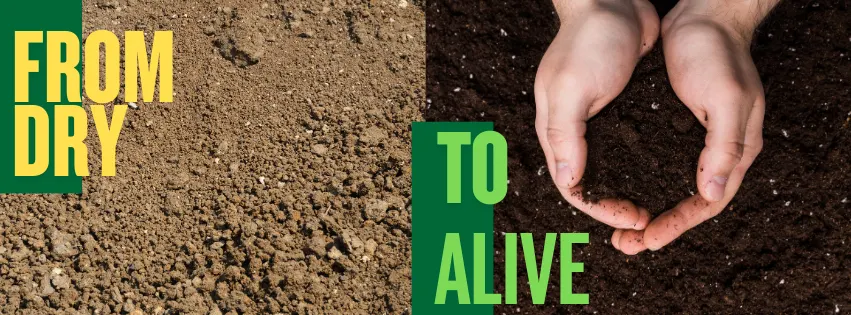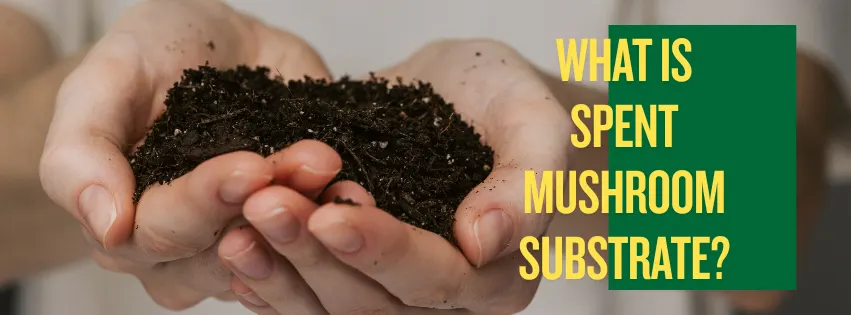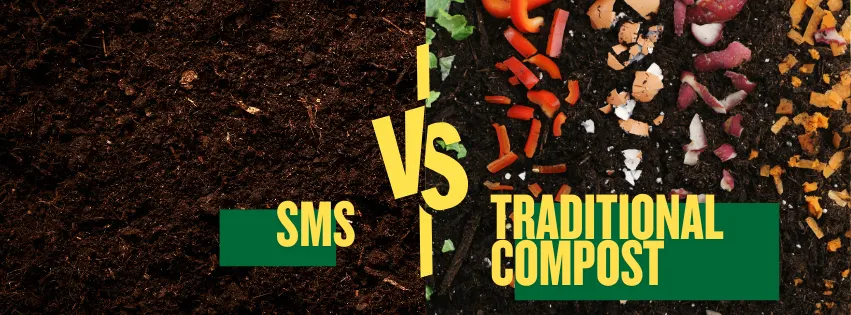How Mushroom Compost Boosts Soil Health & Yield

If you’re a gardener, urban grower, or farmer, you know the foundation of every successful harvest is healthy soil. One of the best, natural ways to boost soil health is using Mushroom Compost, also called Spent Mushroom Substrate (SMS) or simply mushroom waste compost.
This organic material is a by-product of mushroom farming, but for plants and soil, it’s a goldmine. Let’s explore proven benefits of mushroom compost and why it’s becoming the go-to soil booster for gardens, farms, and even commercial landscapes.
1. Rich Source of Balanced Nutrients
One of the greatest benefits of spent mushroom substrate is its nutrient-rich composition. After mushroom harvesting, the compost retains a balanced mix of:
Nitrogen (N): Encourages healthy, green leaf growth.
Phosphorus (P): Strengthens root systems and promotes flowering.
Potassium (K): Improves overall plant strength and disease resistance.
Calcium and Magnesium: Essential for robust cell structure and nutrient uptake.
Unlike synthetic fertilizers that give a quick “burst,” mushroom compost feeds plants slowly and steadily, ensuring longer-lasting soil fertility.
Tip: For kitchen gardens or potted plants, mix 1 part mushroom compost with 3 parts garden soil for best results.
2. Improves Soil Structure and Texture
Healthy roots need healthy soil — loose, well-aerated, and capable of holding the right amount of moisture. This is where mushroom compost benefits shine:
In clay soils, it helps loosen the density, improving drainage and root penetration.
In sandy soils, it retains moisture, preventing your soil from drying out too quickly.
Why it matters: With better soil texture, roots grow deeper and access more nutrients, leading to stronger, healthier plants.
3. Boosts Soil Microbial Activity
Soil is alive, and the tiny organisms living in it are crucial for plant health. Mushroom waste soil benefits include a significant boost in microbial life:
Beneficial microbes break down organic matter and make nutrients more available.
Increased microbial activity supports better root health and disease resistance.
Healthier soil biology leads to more balanced ecosystems for both small gardens and large farms.
Pair mushroom compost with other organic inputs like vermi-compost or natural fertilizers for a thriving, living soil.
4. Sustainable and Reliable Solution for Every Grower
When we talk about sustainability, mushroom compost is a perfect example of waste turned into wealth. Instead of letting the used mushroom substrate end up in a landfill, it is processed and prepared to nourish the soil again a full-circle, eco-friendly solution.
But here’s the thing most people don’t know:
Not all mushroom compost is safe or effective. Fresh or poorly processed compost can have:
High salt levels that damage roots.
Imbalanced pH levels that make plants struggle.
Weed seeds or pathogens that undo all your hard work.
This is why you should always choose a trusted source for your mushroom compost — one that ages, tests, and prepares it properly, ensuring consistency and safety for your soil.
As Sadhguru says:
“Soil is the medium for healthy living — not just for plants, but for everything that breathes.”
Quality inputs keep your soil alive, and healthy soil supports everything growing in it — from a small balcony herb garden to a sprawling field.
5. Proven Impact on Yield and Soil Health
When you use properly aged and balanced mushroom compost, the results are clear:
Healthier Roots, Stronger Plants: Plants establish quickly and stay resilient even during tough weather.
Higher Yields: Farmers see 10–20% more produce in crops like tomatoes, cucumbers, spinach, and wheat.
Better Quality Produce: Soil enriched with quality compost grows crops that are richer in color, taste, and shelf life.
By working with a reliable provider, you’re not just buying compost — you’re investing in soil health, season after season.
6. SMS and the Sustainability Movement
Healthy soil is more than just a farming tool — it’s a foundation for life and sustainability. Sadhguru’s Save Soil movement reminds us that living soil is at the core of a healthy planet.
When you choose quality mushroom compost, you’re doing more than improving your farm or garden:
You’re reducing chemical inputs that harm soil biology.
You’re recycling organic matter, giving it a second life.
You’re building a soil ecosystem that will keep producing for years without depletion.
Think of it this way: Every handful of living, nutrient-rich soil you create is a gift to the next generation fertile land that continues to thrive without damage.
7. How to Use Mushroom Compost the Right Way
Here’s how you can safely and effectively use quality mushroom compost:
For Gardens and Kitchen Growers
Mix 1 part compost with 3 parts soil for pots, grow bags, or raised beds.
Add a light top layer during the growing season to keep moisture locked in and plants nourished.
For Farms
Apply during land preparation and mix evenly into the topsoil.
Use moderate doses regularly to steadily build fertility without shocking the soil.
As Mulch
Spread a thin layer around fruit trees, vegetables, or flowering plants. It regulates temperature, holds water, and keeps weeds away naturally.
Pro Tip: Always ensure the compost is aged, clean, and balanced before application — poor quality can do more harm than good.
Also Read: SMS vs Traditional Compost: What’s Happier for Your Soil?
8. Why Quality and Trust Matter
Here’s why buying mushroom compost from a trusted, expert supplier is non-negotiable:
Consistency: Every batch has the same nutrient profile, ensuring predictable results.
Safety: Aged and treated compost means no weeds, pests, or dangerous salt buildup.
Support: Expert guidance to help you get the best yield and soil improvement every season.
When you invest in quality, you’re not just improving your soil for today — you’re building long-term soil health that keeps giving back.
9. Take the Next Step Towards Healthy Soil
If you want your soil to come alive, don’t settle for random or untreated mushroom waste. Work with trusted, reliable sources that process compost properly and understand how to match it to your soil’s needs.
Healthy soil isn’t just about higher yields; it’s about creating a self-sustaining, thriving ecosystem that will keep giving for years. Just as Sadhguru emphasizes in the Save Soil movement, “If we take care of the soil, the soil will take care of us.”
Mushroom compost isn’t just a soil amendment — it’s a step toward sustainable, smarter farming and gardening.
By choosing a trusted source and using it the right way, you can:
Improve soil fertility naturally.
Support environmental health.
Grow healthier, more resilient crops.
Healthy soil grows healthy plants — and healthy plants grow healthy people.



Pingback: SMS vs Traditional Compost: What’s Happier for Your Soil? -